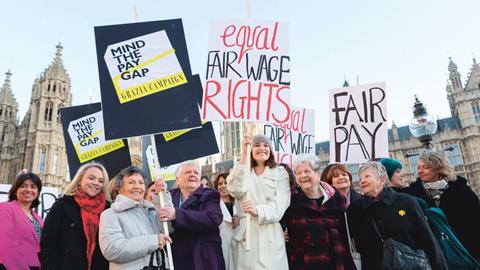In June 1968 women strikers at Ford Dagenham caused the car plant to lose millions of pounds from lost orders as they held out for recognition of their equal contribution to the factory as men. Specifically, the strike was a response to the categorisation of the women’s work as 'B' class, when the men’s work was of the higher 'C' class. The women returned to work after Barbara Castle, who was the then employment secretary, helped to broker a deal with Ford to give the women an extra 7d per hour to end the strike. The agreement acted as a catalyst for the Equal Pay Act 1970.
This article reflects on why it is that despite the persisting gender inequality in the legal sector, women lawyers do not follow the example of the Dagenham machinists and take strike action.
The gender pay gap is a topic of consciousness in the legal sphere. Indeed the Law Society Gender Pay Gap Report of 2018 concluded with a summary of the measures being taken to address the pay gap. This included an on-going review of policies, processes and the reward strategy as well as a review of the recruitment and promotion of women into senior roles. The report made no mention, however, of the possibility of strike action.
Could it be argued that the relatively comfortable pay of women solicitors provides us with less incentive to strike than the Dagenham workers? Also, the expected career progression in the legal world might be a factor. Take a trainee solicitor. The expectation is that they will progress to become an associate, with the real possibility of partnership thereafter. The reputational damage that can be caused by involvement in strike action risks taking away this reality. The situation for the women machinists, where there was no prospect of becoming manager, does not compare.
Perhaps the principles promoted by the Solicitor’s Regulation Authority are another factor. The first six principles of the SRA are: 1) uphold the rule of law and the proper administration of justice; 2) act with integrity; 3) do not allow your independence to be compromised; 4) act in the best interests of each client; 5) provide a proper standard of service to your clients and 6) behave in a way that maintains the trust the public places in you and in the provision of legal services. Is it the case that strike action would compromise these values? Alternatively, are lawyers simply too institutionalised? Are we societally conditioned to be adverse to workplace 'disobedience'? Could it even be said that after the first 100 years of women being in the legal profession, we are still grateful for the opportunities that we have?
Of course, strike action, at least for it be effective, requires collective mobilisation of workers and, correspondently, a certain degree of solidarity. But does the legal profession have this requisite culture of collectivism? It is noteworthy that the percentage of the private sector that is unionised is somewhat lower than in the public sector: in 2016 53% of the public sector was unionised; in contrast, 13% of the private sector was unionised.
This said, as reported by Owen Bowcott in his Guardian article of April 2019, the Legal Sector Workers United was founded this year, with the aim of bringing together all the personnel involved in the legal profession - from barristers and solicitors, to paralegals, receptionists and security guards. Moreover, prominent lawyers are backing the new union, Michael Mansfield QC, for one, calling the initiative 'long overdue' and praising the union’s 'wide constituency of workers who are constantly at risk of exploitation and marginalisation despite their critical role'. Leading employment law barrister John Hendy QC has also publicly supported the union. It is yet to be seen whether the Legal Sector Workers United provides the machinery for strike action or whether the tightening of strike rights and other social factors mentioned in the article will continue to be obstructive to the exercising of the right to strike.
A final question is whether it is even desirable to use strike action in order to take a stand against gender inequality.
It seems difficult to maintain that the unions have the same political clout as they did in the 20th century. Nowadays, the focus seems not to be on 'job security' but 'employment security', the notion of a 'job for life' appearing somewhat outdated. It appears that the expectation for young working professionals today is to simply change job in the instance of dissatisfaction, not strike for change so that they can remain. In any case, it could be argued that a better way to force change is through means other than striking, maybe, for example, by exerting pressure through media exposure. Ultimately, however, the burden should not be on women to force change; we are only part of the solution. Gender inequality is structurally ingrained in society. Law firms need to take the lead to overturn this; an occasional law firm lecture on 'women in law' will not fix the systemic and cultural entrenchment of gender disparity. Instead, we need to aspire for a reality where women’s issues are central to every decision – business-orientated or otherwise – that is made by the law firms, the lawyers and also the institutions that regulate us.
Danielle Cohen, principal solicitor at Danielle Cohen Solicitors, and Helen Taylor, an undergraduate
































7 Readers' comments